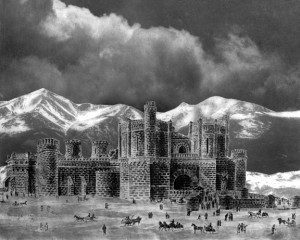by John Mattingly
Out a narrow window I see my new center pivot on the loose, crossing Highway 17. Cars and trucks are jammed and honking as the machine spreads out like a praying mantis on the warpath, pulling its electric line out of the ground like a giant umbilical cord. It runs roughshod over a fence and three power poles, causing flares of flame as the main wire cracks and arcs to ground. The pivot collides with a house and the end tower starts to ascend to the roof. I wake up in a cold sweat.
As you can guess, over forty-two years of farming, I had some real doozies. Like the one of my fields of ripe wheat and barley on fire, wild horses running crazy through leaping flames. Or the earthquake that split my farm in half, leaving a grossly eroded canyon down the middle. Or a deluge that turned my farm into a lake bottom. Or again, a giant cloud of cotton candy falling out of the sky onto my fields, covering everything with a sticky veneer that didn’t rub off. The nightmares occur when I’m away from the farm for more than a few days. Even on a trip to Denver, I can count on several “agrimares,” driven no doubt by the extreme guilt of abandoning my responsibilities, leaving everything to chance, and skipping off the parts unknown like a drunken Judas.
Even after retirement, I have several recurring dreams of fields, such as “the lost field.” During the course of every season, I had many fields, and they became somewhat like children, each field having a personality based on when its ground was ready and in what condition, how well it germinated, and finally, the short but certain legacy of its life — from sprout to commodity. In the dream, I come over a ridge to see a field surrounded by tall trees, a field I’ve totally forgotten this year, yet a field that has been my favorite field many times in the past, meaning it’s an especially good field. I can’t understand how I could have failed to plant it. Both surprised and irritated, I run to the field to find it full of weeds and gopher mounds. It looks abandoned, wounded, fallen, like the surface of the moon. I realize I’ve moved all the machinery far away and can’t do anything now. The field is lost for the season, maybe more. I pick up a handful of its dirt only to find that the field is no longer dirt. It has turned to ash. In one dream the field had become sponge material, in another chocolate, and still another white sand. A deeply irritating variation on this dream is one in which I appear at my favorite field to find I’ve failed to irrigate it and the crop is dead.
Another recurring dream involves walking across a field I’ve planted with wheat, and seeing beans come up in the planter rows. The light is ominous, dark red at the horizon. I dig in the unsprouted areas to find wheat seed, but every seed that has sprouted is a bean plant. Then I dig up one of the sprouted beans to find that, indeed, beans are sprouting from wheat seed. This is very, very disturbing, and even after I wake up, I feel cross-threaded with reality for the rest of the day. With all the uncertainties of farming, one place a farmer can depend on for consistent results is with seeds. Plant wheat, and wheat comes up, plant beans, beans come up. “As ye sow, so shall ye reap.” Few processes are more basic, few processes more dependable. So when beans sprout from wheat seed, the world is probably either nearing “The End,” or we’re being side-swiped by a parallel universe.
But enough with the nightmares. There are also lots of pleasant farmer dreams, and if I may say so in this publication without fear of censorship or over-sharing, farmers have been known to have dreams with sexual content, and yes, I will be making mention of equipment. Delicately penetrating mother earth after the foreplay of massaging a seedbed from her coarse skin is very much an act of love, and I’ve noted that this particular kind of dream became less frequent for me as the mechanization of farming increased.
Back in 1968, when I bought my first 80 acres after the big sugar beet freeze in Larimer County, all my tractors were open air with a metal seat. One tractor had a weatherproof radio mounted on the fender, antenna wagging in the air like a rat’s tail, so I could occasionally listen to music or news or a ball game over the droning of the engine and squeaks of whatever tool the tractor had engaged. At the end of the day, I was covered in dust, ears ringing, eyes watering, hands tingling, hemorrhoids howling. There most definitely was a greater direct contact with the ground through the old machines, and thus the sensations of interaction, or as the metaphor proceeds, intercourse, with the earth were more pronounced.
As time rose on, I purchased tractors with cabs, air conditioning and heater, and eventually air-cushioned action seats and high-end stereo systems that made the actual work of farming more like watching a movie of farming than actually doing it. Wonderful as these machines were, they dissociated farmer from the ground and the earthy dreams of working the ground fell by the wayside.
Dreams of the earthly/sexual variety were always vague, mostly without plot, simply stirring up a sensation of connection with the ground that felt like the bond with a loved one. My father told me the most important thing on the farm was my footprints. This obtained from a kind of hubris common to his generation, a notion that humans were in total control and thus had to be on the spot for anything important, or of value, to happen. I rotated this wisdom a few degrees sunward, allowing myself much less control and much more observation, appreciation, and yes, love of the ground that I believe manifest in these type of dreams. Sometimes they presented with a bright, glowing orb of white or red that I held in my hand, or that hovered over a soft, inviting field.
Of course, there are also dreams of endless bounty, of a crop that is quite literally a braggart’s dream. Bales so thick in the field that it’s impossible to drive through them, wheat or barley or canola with grain heads as large as ice cream cones, drooping to the ground. I have had several dreams of grain bins overflowing. Just the other night I dreamed of looking down on two center pivots of wheat that were doing exceptionally well — 150-160 bushels per acre kind of well. The heads were all filling the fifth and sixth rows, the stalks stiff and standing up to soak in the gentle rain of the rotating pivots. I awoke to a day of uninterrupted peace.
John Mattingly cultivates prose, among other things, and was most recently seen near Creede.

